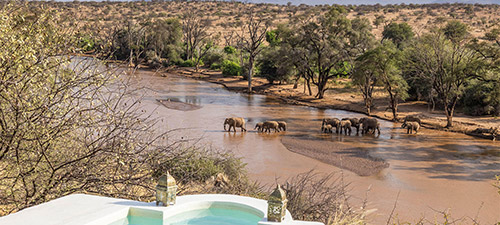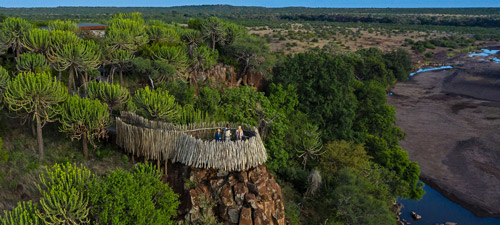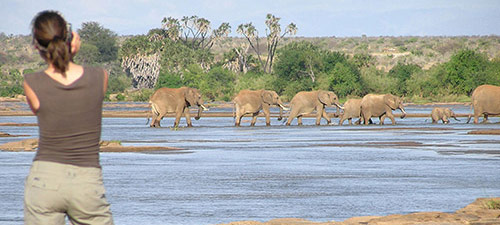I’ve heard Daphne Sheldrick, the world’s expert on raising orphaned baby elephants, say on many occasions that “elephants are like us… but better.”
Growing up I only knew elephants from reading Babar the Elephant books and going to zoos. Later, I would see my first wild elephants in Africa. But it was while visiting the David Sheldrick Wildlife Trust on the edge of Nairobi National Park in Kenya, my love affair with the world’s largest land mammal really began.

I am back at the Sheldrick Centre for my fifth or sixth visit today. I can’t get enough of the place and make a point of visiting whenever I pass through Nairobi.
I’m waiting among a crowd of people, including about 100 local schoolchildren who have never before seen an elephant. We are gathered around a roped-off mud hole.

Out of the woods walk local men dressed in blue-green coveralls, followed by a line of elephants the colour of the red earth we are standing on. Some of the animals run kicking a ball, some lag behind, and others play with the tail of the elephant in front of them.

Their excitement is palpable, their energy contagious and adorable. The young ellies have come to play, wallow in the mud, and take their mid-morning feeding of the milk solution Daphne Sheldrick perfected over years of trial and error.

If the Sheldrick Centre had volunteer positions, I would sign up immediately. I envy the keepers who hand-feed the elephants from gallon-sized “baby” bottles and sleep in the stalls with the baby elephants who need almost constant contact until age three.
I listen to the keepers tell each baby elephant’s story of the tragedy that brought them here to the orphanage. This one fell down a well and was dehydrated when rescued. That one over there watched its whole family being poached and was found vigilantly standing beside her dead mother’s body. This little one is still so fragile she wears a blanket to keep her warm even though it’s 80ºF today.

Each story is as heartbreaking as the next.
But there is a happy ending for most of the 200 elephants that have been brought here over the years. Daphne says, “There is a saying: If you love an animal, set it free, and if it loves you, it will come back to you to thank you from time to time.” She says she has found that to be very true.
After five years at the orphanage (or when they are deemed ready), the young elephants are transferred to holding areas in Tsavo National Park, where they will eventually walk back to the freedom that is their right as a wild elephant. On many occasions, the “re-wilded” elephants will return to this place of transition to say ‘Hi’ to a keeper or ask for help when they have a festering wound, for instance. They never forget the caregivers who saved their lives. And I will never forget my close encounters with these orphaned elephants. They have changed my life.
 Find out about Kenya as your next holiday destination – for a ready-made safari or ask us to build one just for you.
Find out about Kenya as your next holiday destination – for a ready-made safari or ask us to build one just for you.

To comment on this story: Login (or sign up) to our app here - it's a troll-free safe place 🙂.![]()








